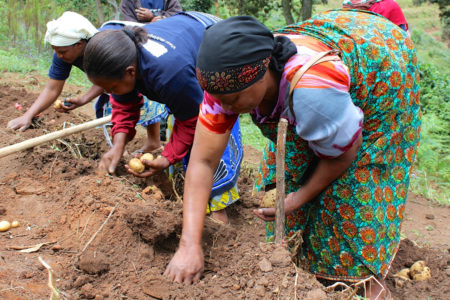 |
| Small-scale farmers are the custodians of Africa’s seed diversity |
“The picture often painted for us is that we need corporate seeds to feed the world: they are alleged to be more efficient, productive and predictable. Locally developed farmer varieties are painted as backwards, less-productive and disease-ridden. But those of us with our feet on the ground know that this is not the reality in Africa,” Million Belay from AFSA and GRAIN’s Henk Hobbelink write in the foreword. They point to the fact that the vast bulk of food produced on the continent comes from homegrown farmers’ seeds – some studies say the share is up to 80%. “If these seeds are so ‘backward’, what moves farmers to keep preserving and planting them and what challenges do they encounter in this effort?” they ask.
The report sheds light on farmer managed seed systems (FMSS), also frequently called “informal”, “local”, “community-managed” or “peasant” seed systems. It concludes that FMSS are not one-size-fits-all; they vary from community to community, are culturally appropriate, customary and inclusive and they produce biodiverse and ecologically resilient seeds. Most importantly, they are centered around community values of selecting, exchanging and sharing seed, as well as sharing knowledge about planting, cultivating, harvesting and processing. Farmers’ seeds are reliable, available and affordable since they are stored locally and are usually distributed for free. “These seeds are intentionally diverse and heterogeneous, and are planted and replanted, season after season, sometimes in mixtures of varieties and with other crops, thus increasing resilience and overall productivity,” says the report. “Farmers’ seeds are very differently nurtured from the way that ‘sow-once’ industrial seeds, some of them genetically modified and all of them designed for monocultures, are manufactured and grown.”
But the report notes that worrisome developments are threatening FMSS in Africa. Farmers are increasingly being pushed to abandon their seed systems. Well-funded promotion, subsidies, coercion and advertising are being deployed in an attempt to roll out industrial seeds and to displace heterogeneous farmers’ varieties suited to biodiverse agroecological contexts. “The intention is to shift and ultimately change public perceptions, so that people come to believe that the problem of feeding the growing population can only be solved by using genetically uniform industrial seeds of relatively few crops pushed by private seed companies, development organizations and the government,” the authors write. “This approach is shown to be in line with the Green Revolution model of intensification which promotes the uptake of chemical-intensive agriculture, especially monocultures of commodity crops, using so-called ‘improved’ seeds and the agrichemicals they require.” African governments are being pressured to join regional agreements on intellectual property, trade and seed, such as OAPI, ARIPO, UEMOA, COMESA and SADC, which benefit corporations and the industrial seed system, and in many cases the governments are giving in.
Based on the research findings in the six African countries covered in the report, AFSA and GRAIN believe that the promotion of industrial seeds and commodity production should stop and farmers’ local access to and control over their seeds should be supported. “Small-scale farmers on the continent need support and funding from their governments if they are to keep practicing agroecology and protecting their cultures and beliefs that are attached to seed,” they write. Governments should instead support local seed systems and local agroecological farming within the framework of food sovereignty. “Protecting and preserving farmer managed seed systems should be the core business of any government in Africa because any attack on our seed sovereignty is a clear attack to food sovereignty of any nation,” states Andrew Adem from the Eastern and Southern Africa Small Scale Farmers Forum (ESAFF), the organization contributing the Uganda case study.










No comments:
Post a Comment